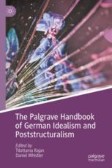Search
Search Results
-
‘Individuality’ in Hegel’s Early Thought
This chapter considers how Hegel’s early thought gradually absorbed ‘individuality,’ with respect to religion, metaphysics and ethics. Beginning with...
-
Schiller and Early German Romantics (Kleist, Hölderlin, Goethe)
Schiller’s importance for the Romantic generation is discussed in relation to three writers and thinkers whose work arose in close connection—and by...
-
On the Art of Tragedy (1792)
In contrast to the essay On the Cause of the Pleasure we derive from Tragic Objects, which was still focused on the notion of effect poetics, the...
-
Schiller’s Horen, Humboldt’s Rhodian Genius, and the Development of Physiological Ideas in Mythical Form
Millán Brusslan focuses upon “Life Force or the Rhodian Genius: A Tale,” an essay Humboldt wrote for Schiller’s journal, Die Horen, to demonstrate...
-
Concerning the Necessary Limits in the Use of Beautiful Forms (1795)
In his essay On the necessary limits in the use of beautiful forms Schiller delineates to what degree beautiful packaging of philosophical thoughts...
-
Schiller’s Philosophy of History
Schiller’s philosophy of history has received comparatively little attention. This is partly because Schiller is perceived as a poor imitation of...
-
The Role of Philosophy in Schiller’s Poetry
Feminella explores the ways in which Schiller both explicitly and implicitly addresses philosophical concepts in the poems “Ode to Joy,” “The Gods of...
-
On the Cause of the Pleasure We Derive from Tragic Objects (1792)
Zelle offers a concise analysis of Schiller’s essay On the Cause of the Pleasure We Derive from Tragic Objects (1792). Zelle emphasises that the...
-
“Upward to Freedom”: Schiller on the Nature and Goals of Aesthetic Education
In this chapter, Louden focuses primarily on Schiller’s rich but elusive concept of aesthetic education, in an attempt to answer the following key...
-
On Naïve and Sentimental Poetry (1795/96)
While working on Letters on the Aesthetic Education of Man, Schiller was already devising and drafting an essay that derived a special theory of...
-
Schiller and the Birth of German Idealism
Friedrich Schiller’s significance for philosophy was established in an irrefutable way by the Neo-Kantians. Following Kuno Fischer’s brilliant...
-
Art
This chapter explores the importance of writing by early nineteenth-century women for post-structuralist accounts of philosophy of art in German...
-
Reading Hegel II: Politics and History
This chapter discusses the criticism of Hegel by poststructuralist authors like Louis Althusser and Gilles Deleuze in the 1960s and 1970s, as well as...
-
Reading Schopenhauer
This chapter examines the writing of Arthur Schopenhauer as an exploration of the discontents of German idealism. Anticipating a poststructuralist...
-
Reading Maimon
This chapter first develops Maimon’s solution to the Kantian problem of the relation between sensibility and understanding, analyzing the central...
-
Apocalypse
G. W. F. Hegel and Jacques Derrida are true masters of a carefully mediated messianic political theology, and what they share is a utilization of the...
-
Reading Kant
This chapter focuses on Jacques Derrida’s forty-year engagement with Kant. Giving Kant a significant place in the early formulation of deconstruction...
-
Language
This chapter stages a confrontation between various post-structuralist materialisms of language and German Idealist naturalisms by way of two case...
-
Nothing
This chapter argues that the return of the question of nothing and negativity in late modernity was in response less to nihilism or existentialism...
-
Schiller on Politics and Political Theory
This contribution explores the political dimension of Schiller’s theoretical writings as well as his plays. Introducing into the basic theses of...
